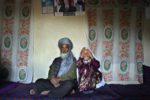A substantial amount of the media critiqued at MMW involves Muslim women being viewed as part of a minority. As flawed as it often is, one wonders if the media in Muslim majority countries may make fewer missteps. Moving on from that possibility, what about countries which have an interpretation of Islam as their legal and constitutional basis?
With satellite and online media rapidly expanding, it is possible to explore this theory. Press TV is an English language new channel, heavily guided/funded by the Iranian state. It focuses mainly on news and documentaries.
One of these documentaries is Maybe Tomorrow, which focuses on life in Afghanistan, both before and after the Taliban. The documentary is 25 minutes long and features interviews with two Afghan politicans: the Presidential candidate Ramazan Bashardost and Fuzie Koffie, a member of parliament (MP).
Bashardost was interviewed at length about rebuilding Afghanistan and how he feels the NGOs have wasted much of the supposed aid. He is seen greeting both members of the public and fellow politicians, while elaborating on his views.
Koffie is first seen in classroom where Afghan women are learning how to use computers. The power cuts and the teacher states that the electricity cuts out several times a day.
While we eventually see Koffie meet with constituents and make phone calls, she is not questioned in as much detail as Bashardost. When asked about being a female MP, she explains that she feels very proud. Then she describes a dilemma common to many Muslim women: that while she is again proud of her traditional values, including her brothers’ protectiveness, she dislikes it when that protectiveness becomes stifling, as it clashes with her views as a feminist.
Sadly, that is as in depth as the documentary gets with Koffie. This seems such a frustratingly missed opportunity and a shoddy attempt at tackling serious issues. Especially as she could give so much insight into the Afghan women’s struggle in reconciling tradition with modernity, with all the complexities that entails.
The main issue was the stark difference in treatment of the two MPs by the documentary makers. Bashardost was allowed to talk at length, was always shown in a professional context and was asked strictly about political matters. Koffie, on the other hand was shown equally at home and at work, but was only allowed short sound bite answers to specific questions, most of which focused on her being a woman and one on who she would vote for.
Afghan women typify the Muslim women experience of being spoken about endlessly, but so rarely being spoken to. When Muslim-owned media is as adept in silencing us as it’s non-Muslim counterparts, one wonders when exactly it will be our time to speak.



